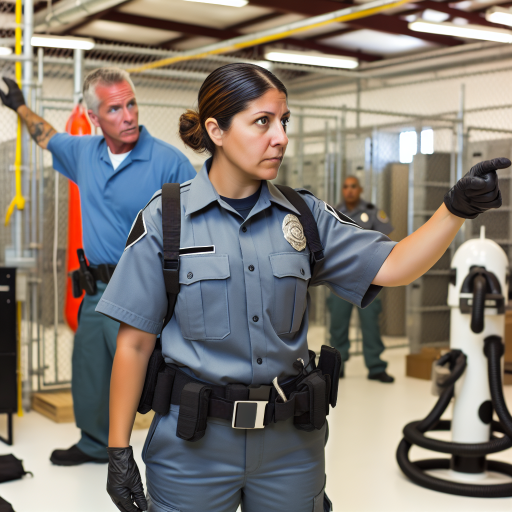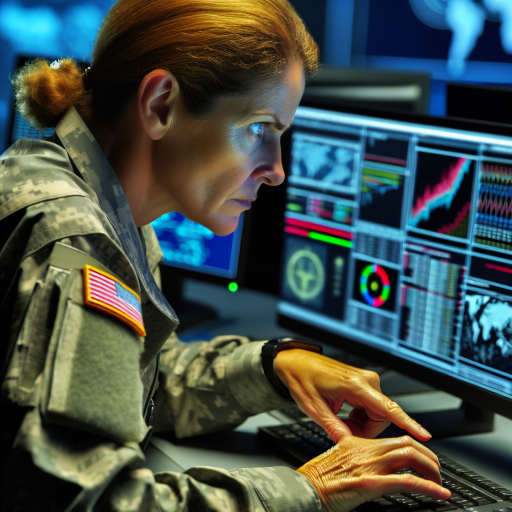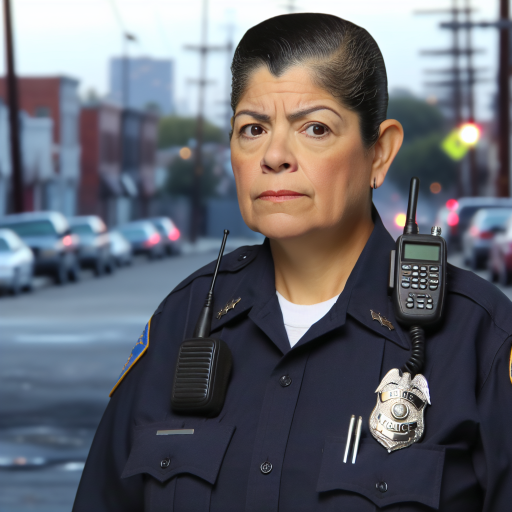Introduction:
Counterterrorism specialist careers involve preventing and responding to acts of terrorism.
Public perception plays a crucial role in determining the success and credibility of these careers.
History of Counterterrorism Specialist Careers:
The evolution of counterterrorism specialist careers dates back to the early 20th century.
Key events like 9/11 have significantly influenced public perception of these careers.
The rise of global terrorism and the need for specialized skills have shaped these careers.
Government agencies like the FBI and CIA have played a crucial role in promoting these careers.
Training programs and certifications have become essential for individuals pursuing counterterrorism specialist careers.
Public Perception of Counterterrorism Specialist Careers:
Media portrayal of counterterrorism specialists often romanticizes the dangerous nature of their work.
Movies and TV shows glamorize the high-stakes and adrenaline-fueled aspects of these careers.
Public perception of counterterrorism specialists is often skewed towards the action-packed and dramatic aspects.
However, the reality is that much of the work involves research, analysis, and strategic planning.
Counterterrorism specialists often work behind the scenes, gathering intelligence and coordinating operations.
Challenges Faced by Counterterrorism Specialists:
Balancing national security concerns with civil liberties is a significant challenge faced by counterterrorism specialists.
The constantly evolving tactics of terrorist groups require counterterrorism specialists to stay ahead of the curve.
Dealing with the psychological impact of dealing with terrorist threats can take a toll on counterterrorism specialists.
Public scrutiny and political pressure can add to the already stressful nature of the job.
Maintaining a high level of professionalism and ethical conduct is crucial for counterterrorism specialists.
Skills and Qualities Needed for Counterterrorism Specialist Careers:
Analytical thinking and problem-solving skills are essential for counterterrorism specialists.
Strong communication skills are crucial for building relationships with other agencies and stakeholders.
The ability to work under pressure and make quick decisions is a must for counterterrorism specialists.
Transform Your Career Today
Unlock a personalized career strategy that drives real results. Get tailored advice and a roadmap designed just for you.
Start NowCultural awareness and language skills can be beneficial in understanding the motivations of terrorist groups.
Adaptability and a willingness to continuously learn and evolve are key traits for success in this field.
Future Trends in Counterterrorism Specialist Careers:
The integration of technology and data analysis will play a significant role in the future of counterterrorism specialist careers.
Collaboration between government agencies and international partners will become increasingly important in combating terrorism.
The focus on countering cyberterrorism and online radicalization will shape the future of counterterrorism specialist careers.
Specialized training programs and certifications will continue to be developed to meet the demands of the changing landscape.
As terrorism evolves, counterterrorism specialists will need to adapt and innovate to stay ahead of threats.
Media Portrayal of Counterterrorism Specialists:
- Analyze how movies, TV shows, and news coverage depict counterterrorism specialists.
- Explore the impact of media portrayal on public perception.
Movies:
Movies have often portrayed counterterrorism specialists as heroic figures who are willing to sacrifice their lives for the greater good.
They are shown as highly skilled individuals who possess advanced training and expertise in handling complex situations.
However, some movies can exaggerate the capabilities of these specialists, showcasing them as almost superhuman in their abilities to thwart terrorist plots.
This can create unrealistic expectations among the public about the actual work and challenges faced by counterterrorism specialists in real life.
TV Shows:
TV shows tend to glamorize the work of counterterrorism specialists, depicting them as fearless and invincible warriors who always emerge victorious in their missions.
These shows often focus on the high-stakes nature of their work, showcasing intense action sequences and dramatic plot twists.
While entertaining, this portrayal can oversimplify the complex and nuanced nature of counterterrorism work.
It gives the public a skewed perception of the realities faced by these specialists on a daily basis.
News Coverage:
News coverage of counterterrorism specialists can vary significantly depending on the context and political climate.
In times of heightened security threats or after a successful counterterrorism operation, the media tends to highlight the bravery and professionalism of these specialists.
However, negative incidents or allegations of misconduct can quickly tarnish their reputation in the eyes of the public.
Showcase Your Business Today
Reach thousands of readers actively exploring professional services. Publish your business profile and grow your audience now.
Publish NowIt is crucial for media outlets to provide accurate and balanced coverage of counterterrorism specialists.
This ensures that the public’s perception is well-informed and realistic.
Impact on Public Perception:
The way counterterrorism specialists are portrayed in the media can have a significant impact on public perception.
Positive portrayals can enhance public trust and confidence in these specialists.
This highlights their vital role in national security efforts.
On the other hand, negative or sensationalized portrayals can breed mistrust and skepticism.
These portrayals undermine the credibility of these specialists and their organizations.
It is essential for the media to strike a balance between showcasing the heroism and challenges faced by counterterrorism specialists.
They must also provide a realistic and nuanced portrayal of their work.
You Might Also Like: Legal Processes and DEA Agent Involvement
Public Misconceptions About Counterterrorism Specialists:
Counterterrorism specialists are often portrayed as aggressive or violent individuals.
In reality, these professionals are highly trained in conflict resolution and strategic thinking.
People mistakenly believe that all counterterrorism specialists are involved in combat missions.
Many specialists work behind the scenes in intelligence analysis and planning operations.
There is a misconception that counterterrorism specialists only focus on military tactics.
These professionals also engage in diplomacy, negotiation, and working with local communities.
Some individuals fear that counterterrorism specialists have a high risk of injury or death.
While there are risks involved, specialists prioritize safety and minimize threats through careful planning.
It is commonly believed that counterterrorism specialists operate without regard for human rights.
In reality, these professionals adhere to strict ethical standards and legal protocols.
By addressing these myths and misconceptions surrounding counterterrorism specialist careers, we can provide a more accurate understanding of the important work these professionals do to keep us safe.
It is crucial to recognize the diverse skills and responsibilities that counterterrorism specialists possess, beyond the narrow stereotypes often perpetuated by media portrayals.
Uncover the Details: Impact of Border Patrol on Local Communities
Training and Skills Required for Counterterrorism Specialists:
Counterterrorism professionals typically hold degrees in fields such as criminal justice, international relations, or security studies.
These educational backgrounds provide a solid foundation of knowledge in the various aspects of counterterrorism.
Advanced degrees, such as a Master’s in Homeland Security, can further enhance their expertise in the field.
Counterterrorism specialists often undergo specialized training programs offered by government agencies or private organizations.
These programs cover topics such as threat assessment, intelligence analysis, and response protocols.
Obtaining certifications such as the Certified Counterterrorism Specialist (CCTS) can demonstrate a high level of proficiency in the field.
Effective communication skills are essential for counterterrorism specialists to collaborate with various law enforcement agencies and international partners.
Analytical skills help professionals assess complex threats and develop strategic responses to mitigate risks.
Problem-solving abilities enable specialists to navigate unpredictable situations and make critical decisions under pressure.
Attention to detail is crucial in analyzing vast amounts of data and identifying potential security threats.
Physical fitness is important for field agents who may need to respond to emergencies or engage in tactical operations.
These requirements contribute to public perceptions of the counterterrorism profession in several ways:
The rigorous educational and training requirements instill confidence in the public that counterterrorism specialists are well-prepared to handle security threats.
Public perception of counterterrorism professionals as highly skilled and knowledgeable individuals is enhanced by their qualifications.
Specialized skills and certifications demonstrate to the public that counterterrorism specialists have the expertise to address complex security challenges effectively.
Perceptions of professionalism and competence contribute to a positive image of the profession and inspire trust in the capabilities of these specialists.
Gain More Insights: The Role of Private Investigators in Civil Cases
Showcase Your Business Today
Reach thousands of readers actively exploring professional services. Publish your business profile and grow your audience now.
Publish NowRole of Counterterrorism Specialists in National Security:
Counterterrorism specialists are vital in safeguarding national security against terrorist threats.
Their expertise in analyzing intelligence helps to prevent potential attacks on a country.
Counterterrorism specialists work closely with law enforcement agencies to track and apprehend terrorists.
They collaborate with other countries’ intelligence agencies to gather information on global terrorist networks.
These specialists conduct risk assessments and develop strategies to mitigate terrorism threats.
Counterterrorism specialists are involved in identifying vulnerabilities in national security systems.
They play a key role in responding to terrorist incidents and managing crisis situations effectively.
Examples of Successful Interventions by Counterterrorism Specialists:
The thwarting of a planned terrorist attack on a major city through intelligence gathering.
Disruption of terrorist financing networks by tracing and blocking funding sources.
Capture of high-profile terrorist leaders through covert operations and surveillance.
Foiling of a terrorist plot at a major public event, ensuring the safety of attendees.
Interception of communications that led to the arrest of individuals involved in terrorist activities.
Preventing the smuggling of weapons and explosives across borders through effective border control measures.
Neutralizing terrorist cells by conducting targeted raids based on actionable intelligence.
See Related Content: A Day in the Life of a Crime Scene Investigator

Public Trust and Confidence in Counterterrorism Specialists:
When it comes to counterterrorism specialists, public trust and confidence play a crucial role in shaping perceptions and attitudes towards these professionals.
Surveys and studies have been conducted to measure the level of trust that the public has in counterterrorism specialists.
Here are some key findings from these surveys and studies:
- The majority of respondents express moderate to high levels of trust in counterterrorism specialists, citing their expertise and dedication to national security as reasons for their trust.
- Factors that influence public confidence in these professionals include transparency in their work, effective communication with the public, and successful prevention of terrorist attacks.
- Additionally, the public looks for reassurance from government agencies that oversee counterterrorism efforts, such as regular updates on threats and mitigation strategies.
Studies have shown that public trust in counterterrorism specialists is directly linked to their perceived effectiveness in safeguarding the nation from terrorist threats.
Therefore, building and maintaining trust among the general populace is essential for the success of counterterrorism efforts.
Public trust and confidence in counterterrorism specialists are key components in the fight against terrorism.
By addressing factors that influence public perception and ensuring transparency in their work, these professionals can continue to earn the trust and support of the communities they serve.
Diversity and Inclusion in Counterterrorism Specialist Careers:
In recent years, there has been a growing recognition of the importance of diversity and inclusion in all areas of society, including the field of counterterrorism.
This shift in mindset has sparked efforts to promote diversity and inclusivity within the counterterrorism specialist careers.
One of the key reasons behind the push for diversity in counterterrorism is the need for different perspectives and approaches to tackling complex security challenges.
By bringing together individuals from diverse backgrounds, experiences, and cultures, the field of counterterrorism can benefit from a wide range of skills, insights, and innovative solutions.
In addition to enhancing the effectiveness of counterterrorism efforts, diversity also plays a crucial role in shaping public perception of counterterrorism specialists.
When individuals from various demographic groups are represented in the field, it helps to build trust and credibility with diverse communities.
Studies have shown that diverse teams are more successful in building relationships and communicating effectively with diverse populations.
This can be particularly important in counterterrorism, where collaboration with communities is essential for preventing radicalization and fostering cooperation in counterterrorism efforts.
Furthermore, promoting diversity and inclusion in counterterrorism careers can help to address biases and stereotypes that may exist within the field.
By creating a more inclusive environment, counterterrorism organizations can attract and retain talented individuals from underrepresented groups, strengthening their teams and enhancing their overall effectiveness.
Diversity and inclusion are vital components of a successful counterterrorism strategy.
By embracing diversity, counterterrorism specialists can bring a variety of perspectives to the table, foster better relationships with communities, and ultimately improve their effectiveness in countering terrorism threats.
- Efforts are being made to promote diversity and inclusivity in the field of counterterrorism.
- Diversity has a positive impact on public perception of counterterrorism specialists.
Counterterrorism Specialists and Public Perception
After analyzing the public perception of counterterrorism specialist careers, it is evident that misconceptions and stereotypes exist.
Many individuals hold negative views towards these professionals, often associating them with violence and aggression.
However, it is crucial to recognize the importance of the work carried out by counterterrorism specialists in safeguarding national security.
Creating a positive image for these professionals is essential to highlight their dedication and commitment.
By debunking myths and emphasizing the value of their work, the public can gain a better understanding of their roles.
It is imperative to showcase the skills and expertise of counterterrorism specialists to garner respect and appreciation.
Showcase Your Business Today
Reach thousands of readers actively exploring professional services. Publish your business profile and grow your audience now.
Publish NowEngaging with the community and fostering open communication can help bridge the gap between public perception and reality.
It is vital to educate the public about the vital role that counterterrorism specialists play in maintaining safety and security.
By fostering a positive image for these professionals, we can promote greater understanding and support for their crucial work.
Additional Resources
U.S. Department of Homeland Security | LinkedIn
[E-Books for Sale]
The Big Book of 500 High-Paying Jobs in America: Unlock Your Earning Potential
$19.99 • 500 High-Paying Jobs • 330 pages
Explore 500 high-paying jobs in America and learn how to boost your career, earn more, and achieve success!
See All 500 High-Paying Jobs of this E-Book
1001 Professions Without a Degree: High-Paying American Jobs You Can Start Now
$19.99 • 1001 Professions Without a Degree • 174 pages
Discover 1001 high-paying jobs without a degree! Unlock career tips, skills, and success strategies for just $19.99!




